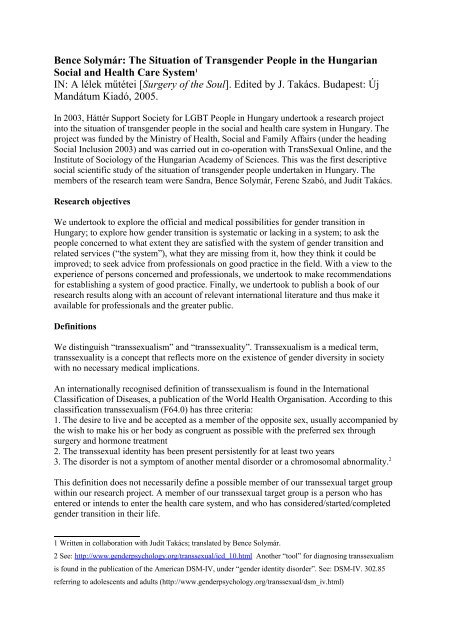Bence Solymár: The Situation of Transgender People ... - ILGA Europe
Bence Solymár: The Situation of Transgender People ... - ILGA Europe
Bence Solymár: The Situation of Transgender People ... - ILGA Europe
Create successful ePaper yourself
Turn your PDF publications into a flip-book with our unique Google optimized e-Paper software.
incomprehensible for people with little or no background knowledge, thus they are not areliable source <strong>of</strong> information. <strong>The</strong>refore we approached the Ministry <strong>of</strong> Health, Social andFamily Affairs for information on the situation and rules <strong>of</strong> gender transition in Hungary. Wereceived a written reply from the Department <strong>of</strong> Health Policy, which we included in ourresources. Further assistance was received from József Kárpáti (Co-ordinator <strong>of</strong> the Gay LegalAid <strong>of</strong> Háttér) and Don Bisson (Director <strong>of</strong> Eastern <strong>Europe</strong>, Council <strong>of</strong> <strong>Europe</strong> and<strong>Transgender</strong> Programmes, <strong>ILGA</strong>-<strong>Europe</strong>) in the overview <strong>of</strong> the current legal status <strong>of</strong>transsexual persons.Main findingsWe chose to present the main findings <strong>of</strong> our research recounting the recommendations wemade for a good practice in relation with the way the state health care system and government<strong>of</strong>fices treat transsexual people. <strong>The</strong> research results <strong>of</strong> the project are significantly shortenedhere. <strong>The</strong> recommendations, however, reveal the current situation <strong>of</strong> transsexual people andcreate a vision <strong>of</strong> a transgender citizen who can access public institutions as a member <strong>of</strong> thecommunity <strong>of</strong> citizens, whose rights summarized by Plummer’s term “intimate citizenship” 6are granted by the state.I. <strong>The</strong>re is a need to establish a transpositive medical practice, which involves addressingpr<strong>of</strong>essionals’ prejudices where necessaryAt the beginning <strong>of</strong> our interviews with pr<strong>of</strong>essionals, we asked for a definition <strong>of</strong>transsexuality. Most respondents agreed that the main characteristic <strong>of</strong> a transsexual person isthat they have a need to harmonise their self-concept and their body. However, there aresignificant differences in their approach. Some psychiatrists argued for the existence <strong>of</strong> atransgender continuum, which allows for certain cases to be approached by psychotherapy,while surgery is necessary in other cases. One psychiatrist, the surgeon and the urologist,however, thought that the only solution for the condition <strong>of</strong> a transsexual person is surgery.Some pr<strong>of</strong>essionals were aware <strong>of</strong> the definition <strong>of</strong> the World Health Organisation. Ourethologist respondent, however, talked about homosexuality throughout the interview as iftranssexuality was non-existent.One psychiatrist specifically mentioned differential diagnostics, as a method for diagnosing apatient’s transsexual condition. Most respondents talked about similar ways <strong>of</strong> diagnosingtranssexualism. <strong>The</strong>re seemed to be a consensus about the need to distinguish transsexualismfrom homosexuality, transvestitism, intersex conditions and psychotic disorders.Homosexuality and transvestitism were mentioned the most <strong>of</strong>ten in opposition totranssexualism. <strong>The</strong> extent to which respondents could distinguish between these categoriesvaried greatly.Two respondents contended that transsexualism can be conceptualised as an extreme form <strong>of</strong>homosexuality. One <strong>of</strong> these (a psychiatrist) still thought that transsexualism can be treatedmedically, although allowing for a certain number <strong>of</strong> cases where psychotherapy couldprevent the need for surgery and hormone therapy. <strong>The</strong> other respondent (the ethologist)argued that transsexualism as a status needing medical intervention could be prevented ifsocieties could learn to recognise homosexuality as a matter <strong>of</strong> natural human diversity. In6 See Judit Takács (2005) How to put equality into practice? Anti-discrimination and equal treatmentpolicymaking and LGBT people. OSI - International Policy Fellowship, Budapest. Research paper.www.policy.hu/takacs
contrast, there was one psychiatrist who said “[transsexualism] is very far fromhomosexuality, but let us not waste words on this.”Our transgender respondents <strong>of</strong>ten recounted a process <strong>of</strong> realising they were transsexual,which included temporary identification with a homosexual or transvestite identity. This wassubsequently rejected when the need for full gender transitioning became obvious for theindividuals. Some respondents felt the need to assert that they were not homosexual ortransvestite, and some even considered these to be forms <strong>of</strong> social deviance.We need to note that neither ICD-10, nor DSM-IV mentions homosexuality as comparable totranssexualism or gender dysphoria. This comparison is a construct <strong>of</strong> both pr<strong>of</strong>essionals andtransgender people. A homosexual identity as a non-conformist gender (partner’s gender-)related identity, with the sub-cultural institution <strong>of</strong> gender transgression presented in thephenomenon <strong>of</strong> “drag”, lends itself as a temporary ally or helper in expressing ways <strong>of</strong> crossgenderidentification. However, a homosexual subculture is so widely and strongly associatedwith cross-gender behaviour in the heterosexual matrix <strong>of</strong> heterosexist thinking (cf. Butler1990) that it permeates the expectations/responses <strong>of</strong> both pr<strong>of</strong>essionals and transgenderpeople. That a transsexual person should not be homosexual is not a recognised diagnosticcriterion: It can therefore be listed among the prejudices <strong>of</strong> pr<strong>of</strong>essionals (and patients) thatgovern the clinical relationship.Homophobia and transphobia exhibited by both pr<strong>of</strong>essional and patient can be harmful whendiagnosing a transsexual person, who may find him/herself conspiring in the game <strong>of</strong>transsexualism as a psychological illness. This game could get in the way <strong>of</strong> clarifying whathe/she needs to ensure psychological well-being and coping with gender dysphoria.Rupert Raj defines “'clinical transphobia' as follows: within the context <strong>of</strong> the pr<strong>of</strong>essionalworking relationship between clinician and client, any belief, attitude, act or behavior(whether therapist- and/or client-generated) which negatively values, denies, undermines,discourages or disempowers trans-identified or GV [gender variant] clients in terms <strong>of</strong> theirunique identities and subjective realities (including, but not restricted to, physical sex, genderidentity, sexual orientation and sexual identity), quality <strong>of</strong> life, the pursuit <strong>of</strong> selfdeterminationand human rights, and the right to comprehensive health care. (If clinicaltransphobia is initiated by the therapist, we can call this 'therapist transphobia', and ifinternalized by the client, 'client transphobia (internalized)'. By comparison, 'clinicaltranspositivity' can be defined as its diametrical opposite, substituting, where appropriate, thephrase: positively values, affirms, supports, encourages and empowers.” (cf. Raj, 2002).Whereas homophobia and even a specific form <strong>of</strong> transphobia may be silently agreed betweena pr<strong>of</strong>essional and a transsexual patient in a clinical setting, there are other forms <strong>of</strong>transphobic clinical practice that are based on pr<strong>of</strong>essionals’ expectations that the transsexualpatient should conform to other gender-stereotypes and certain ethical premises.<strong>The</strong> transphobic, homophobic expectations, prejudices and extra requirements that were foundin our interviews with pr<strong>of</strong>essionals conjure up an ideal transsexual patient who has alwayshad trouble with social integration in his/her birth sex; who is heterosexual and findshomosexuality repulsive; who never had any sexual experience in their birth sex; whoconforms to the stereotypes <strong>of</strong> his/her self-identified gender in appearance and behaviour; whois determined to undergo gender reassignment surgery at all costs; who is never willing toappear in the media as a transsexual person; who is secretive and will be secretive abouthis/her gender condition and who is not influenced by financial aspects in his/her decision to
undergo surgery.II. <strong>The</strong>re is a need to set up a team <strong>of</strong> pr<strong>of</strong>essionals working in the field <strong>of</strong> health careprovision for transsexual persons<strong>The</strong> opinions <strong>of</strong> pr<strong>of</strong>essionals and transsexuals are in agreement; there is a need for a team <strong>of</strong>pr<strong>of</strong>essionals working in the field.Psychiatrists <strong>of</strong>ten stressed that they do not know anything about the transition <strong>of</strong> theirtranssexual patients after they have given referrals for hormone therapy and surgery. This doesnot give them an opportunity to see their decisions and referrals confirmed. Transsexualpersons <strong>of</strong>ten go back to psychiatrists only when they have attempted suicide, suffereddepression or experienced other mental health difficulties. Our clinical psychologistrespondent mentioned that transsexual people go to see her to get their diagnosis just like anyperson goes to have their blood-pressure taken. Some psychiatrists agree that the steps afterreferral, such as hormone treatment, the change in social relations and extremely hazardoussurgery would probably require some psychological support.As they have no connection with the psychiatrist who writes the referral, surgeons tend to beextremely cautious, ask for all the <strong>of</strong>ficial documents, read referrals several times, and in somecases question the diagnosis <strong>of</strong> the psychiatrist. Our surgeon respondents felt as great a needto get to know their patients as some psychiatrists. <strong>The</strong>y talked about carefully readingreferrals and talking to their transsexual patients before surgery. Although whenever a hospitalundertakes gender reassignment surgery as one-<strong>of</strong>f occasion, there is an ad hoc team <strong>of</strong>surgeons to carry out the operation, this team focuses only on the surgical techniques.<strong>The</strong> lack <strong>of</strong> pr<strong>of</strong>essional teams also means that the diagnosis/recognition <strong>of</strong> a transsexualperson is more subject to individual pr<strong>of</strong>essionals’ judgement, where prejudices andstereotypes may prevail as a result <strong>of</strong> insufficient experience in meeting and treatingtranssexual people. Our research team concluded that creating a team <strong>of</strong> pr<strong>of</strong>essionals wouldhelp tackle clinical transphobia and consequently increase the chance to establish transpositivepractice.Some <strong>of</strong> the pr<strong>of</strong>essionals’ ideas <strong>of</strong> what a team would look like were:* a group <strong>of</strong> surgeons would include a urologist, a gynaecologist, a plastic surgeon and aninternal specialist* an institution made available for people seeking advice about transgender issues on the samedrop-in basis as drug policlinics are set up in Hungary* an institution that would provide research, advice and treatment in the field, including aftercarein the form <strong>of</strong> groups for post-operative transsexual people to facilitate their personaldevelopment* a sexual problems clinic that would treat all sexual problems and would deal withtransgender issues as well.One psychiatrist respondent thought that some transsexual people would also benefit from thehelp <strong>of</strong> a social worker in finding their way through the complexities <strong>of</strong> <strong>of</strong>ficial gendertransition and getting the necessary funding for surgery.<strong>The</strong> framework, in which a team <strong>of</strong> pr<strong>of</strong>essionals would work, would be largely determined bythe funding that could be allocated to transsexual care. <strong>The</strong> inclusion <strong>of</strong> transsexual care in a
wider institutional structure could secure and regulate funding for pr<strong>of</strong>essional developmentas well as create a space for team consultation, supervision and process work with patients.Without an institution like this, transsexual people still face having to break new ground andfind for themselves pr<strong>of</strong>essionals who consider the new task pr<strong>of</strong>essionally challengingenough to undertake it with no previous experience. Such operations lack <strong>of</strong>ficial recognitionwithin the health care system, and <strong>of</strong>ten require patients to pay “incentives” to doctors. All <strong>of</strong>these factors reduce the effectiveness <strong>of</strong> transsexual care, make patients face <strong>of</strong>ten far toocomplicated situations and do not ensure that the patent is treated with respect.III. A specific <strong>of</strong>fice within the Ministry <strong>of</strong> Health, Social and Family Affairs should takeresponsibility for transsexual careSome <strong>of</strong> our respondents, both pr<strong>of</strong>essional and transsexual, thought that there was a certainunwillingness <strong>of</strong> governmental bodies to deal with transsexual people.<strong>The</strong> change <strong>of</strong> <strong>of</strong>ficial documents belongs to the scope <strong>of</strong> the Ministry <strong>of</strong> Domestic Affairs,whereas gender reassignment surgery and hormone treatment belongs to the scope <strong>of</strong> theMinistry <strong>of</strong> Health Social and Family Affairs. One psychiatrist pointed out that the latterministry is unwilling to undertake responsibility for transsexual care. This Ministry still doesdeal with issues around the authorisation <strong>of</strong> gender transition, although without a mandate,accountability or transparency <strong>of</strong> practice.Respondents’ opinions agree that once transsexualism is recognised as a condition that mayrequire medical intervention, transsexual patients are entitled to treatment within the statehealth care system. <strong>The</strong>re is a need for the institutionalisation <strong>of</strong> transsexual care, withoutwhich treatment cannot be ensured.<strong>The</strong> Department <strong>of</strong> Health Policy in the Ministry <strong>of</strong> Health, Social and Family Affairs hasbeen providing some unclear basic information to transsexual people, but it does not seem toundertake to cope with any further issues in which transsexual people may need <strong>of</strong>ficialassistance.Transsexual care is not institutionalised, the quality <strong>of</strong> treatment is not monitored, and bothpr<strong>of</strong>essionals and transsexual patients are missing the support <strong>of</strong> an institutional structure.Institutional reform, however, can only take place with the active involvement and facilitation<strong>of</strong> a governmental body. Our respondents thought that the vast majority <strong>of</strong> issues withintranssexual care are health-related, therefore, the treatment for transsexual people should bethe responsibility <strong>of</strong> the Ministry <strong>of</strong> Health, Social and Family Affairs.<strong>The</strong> current lack <strong>of</strong> regulation, institutionalisation and <strong>of</strong>ficial responsibility means thatultimately some transsexual patients’ lives are endangered. No one is willing to takeresponsibility for (sometimes life-threatening) surgical failures. <strong>The</strong> patients do not even havethe power <strong>of</strong> an average citizen to enforce their right to receive appropriate treatment, astransphobia is wide-spread and difficult to tackle.IV. Gender transition should be regulated: its legal basis should be established andtransparency <strong>of</strong> practice ensuredSome pr<strong>of</strong>essional respondents recalled their first encounters with transsexual patients aspeople who had been redirected to several institutions that mostly refused to deal with them.
<strong>The</strong>y had not been able to find their place in the health care system.<strong>The</strong>re is current practice which deals with transsexual people, although no regulation providesrules for their <strong>of</strong>ficial or medical gender transition. This makes transsexual people extremelyvulnerable as citizens and as patients, leaving them with very few rights to enforce.When asked, transsexual respondents recounted very different paths they had to go along to<strong>of</strong>ficially change their names and genders, and even more diverse ways they managed (if atall) to get funding for different stages <strong>of</strong> gender reassignment surgery. Several transsexualrespondents reported difficulties in accessing the health service and complained <strong>of</strong> theslowness and lack <strong>of</strong> transparency <strong>of</strong> <strong>of</strong>ficial procedures, especially regarding the allocation <strong>of</strong>funds for surgery.One pr<strong>of</strong>essional respondent knew about attempts to <strong>of</strong>ficially settle the issues regardingtranssexual care. However, our research team was not informed <strong>of</strong> the details <strong>of</strong> this by theMinistry <strong>of</strong> Health, Social and Family Affairs. We were informed that transsexual careextended no further than the change <strong>of</strong> birth certificates, mastectomy for female to maletranssexuals and “castration” 7 for male to female transsexuals. Hormone therapy and furthersurgery was not <strong>of</strong>ficially available as state funded treatment.As it is possible to change birth certificates in Hungary, a person who has changed their<strong>of</strong>ficial gender bears the same rights and responsibilities as anyone <strong>of</strong> his/her gender.However, transsexual citizens’ rights do suffer when their previous marriages are voided andwhen they lose their rights as guardians <strong>of</strong> their children. Furthermore, their rights to adequatehealth care are severely affected.We were informed from current media publications that in some cases medical pr<strong>of</strong>essionalswith adequate pr<strong>of</strong>essional expertise had used the complexity <strong>of</strong> half-<strong>of</strong>ficial procedures topostpone or passively deny treatment. In one case, a surgeon in a scientific lecture on TVrecalled his former boss’s opinion that the transsexual person in question would not be able toobtain the necessary referrals, anyway 8 .We concluded that there is a need to set out the rules <strong>of</strong> gender transition in Hungary. Thisshould be based on sufficient research to take into account the concerns and discover theneeds <strong>of</strong> transsexual people. 9V. <strong>The</strong> scope <strong>of</strong> state funded gender realignment surgery should be definedMany <strong>of</strong> our transsexual respondents complained about difficulties in securing funding fordifferent stages <strong>of</strong> their gender realignment surgery. A government <strong>of</strong>ficial informed us thatother than mastectomy and orchiectomy/penectomy, no surgery is <strong>of</strong>ficially available for7 This is the word used in the <strong>of</strong>ficial letter instead <strong>of</strong> orchiectomy/penectomy.8 Public lecture given by Borsos, Antal on April 5, 2004. Title: A nemek kialakulásának zavarai azemberben (Disorders <strong>of</strong> the development <strong>of</strong> the sexes)http://www.mindentudas.hu/borsos/index.html9 Our research was funded by the Ministry <strong>of</strong> Health, Social and Family Affairs within the EU-funded project“Social Inclusion 2004”. This can be considered as recognition <strong>of</strong> the need to consciously include transsexualpeople in health care provision.
transsexual people. Contrary to this, other surgery had been done in hospitals in the past, suchas hysterectomy, phalloplasty and vaginoplasty, under different titles <strong>of</strong> treatment.Apart from the obvious insecurity <strong>of</strong> this situation, transsexual patients criticised transsexualcare as something entirely random and unsystematic, providing only for the more pushy andbloody-minded. Some also reported appalling and inhumane treatment from medicalpr<strong>of</strong>essionals. As there is no waiting list to refer to, patients do not know when surgery mightbe available.In the past, the lack <strong>of</strong> a care system for transsexuals posed a different danger to transsexualpeople. <strong>The</strong>re was a rule, albeit unwritten, that in order to change one’s birth certificate andother <strong>of</strong>ficial documents, a person should have undergone irreversible changes. State <strong>of</strong>ficialsrequired patients to go through this process without any help or recognition.According to a pr<strong>of</strong>essional respondent, this unfair arrangement was abandoned because <strong>of</strong> thehigh rate <strong>of</strong> unsuccessful and dangerous surgery. Current practice, since January 2004, leavessurgery as an option for which the state takes no responsibility.Mastectomy and orchiectomy/penectomy can be performed anywhere in the state health caresystem, free <strong>of</strong> charge. This fake and dangerous liberalism. Treatment is not available at everylocal hospital. Transphobia and lack <strong>of</strong> expertise make safe treatment unlikely. Furthermore,these surgical interventions are not sufficient to treat transsexual patients. Hormonereplacement therapy and further surgery, such as metoidioplasty, phalloplasty for transmen,orchiectomy/penectomy, vaginoplasty, tracheal shave and electrolysis for transwomen are alsorequired.<strong>The</strong> quantity and types <strong>of</strong> surgery and corrective surgery vary between individuals. <strong>The</strong>current situation could be much improved, according to our transsexual respondents, if thestate set out the types <strong>of</strong> treatment available for transsexual people within the state health caresystem. It would make the path <strong>of</strong> gender transition clearer, and transsexual patients couldplan ahead, which would have great psychological benefits.VI. <strong>The</strong> scope <strong>of</strong> state funding should take into account the needs <strong>of</strong> transsexual peopleWe concluded that a revision <strong>of</strong> state funded treatment <strong>of</strong> transsexual people is necessary andthat it should take into consideration at least the most basic treatment needs <strong>of</strong> transsexualpeople that would facilitate their overall health and well-being. At present a transsexualperson may be damaged by inadequate treatment or may suffer because <strong>of</strong> a lack <strong>of</strong> treatment.Our transsexual respondents told us about their struggles to secure state funding for theirsurgery. In one case, a respondent recalled the early 90s when he had to pay a significantamount <strong>of</strong> money for his mastectomy. Although the surgeon was convinced that it should befunded by the state, he did nothing to help secure funding for his patient.In 2003-2004, when our research was carried out, the situation had changed. In one case, asurgeon specialising in breast problems, after performing mastectomy on one patient, decidedto take up an interest in gender reassignment surgery. Although his patient had to pay formastectomy and all aspects <strong>of</strong> hospital treatment, the surgeon set out to secure state fundingand convene a team <strong>of</strong> other doctors for the patient’s phalloplasty.Apparently, when a pr<strong>of</strong>essional decides to take an interest in the case <strong>of</strong> his/her patient,
he/she comes up against the same barriers as the patient. Growing pr<strong>of</strong>essional interest,however, can increase the pressure on the state health care system to provide more fundedsurgery to transsexual people, which may create alliances between pr<strong>of</strong>essionals and patients.Lack <strong>of</strong> pr<strong>of</strong>essional experience may result in poor quality surgery. Some pr<strong>of</strong>essionalrespondents expressed a wish for the opportunity to learn specific surgical techniques anddevelop their pr<strong>of</strong>essional knowledge in the field. Without this, patients who currentlyundergo gender reassignment in Hungary are likely to be the test dummies <strong>of</strong> semipr<strong>of</strong>essionalpractice without even the minimum guarantee that any problems resulting frominadequate treatment will be treated as the responsibility <strong>of</strong> the health care system.<strong>The</strong>refore, when we talk about funding for transsexual care, such as funding for hormonetreatment and various types <strong>of</strong> surgery, we also need to consider funding for pr<strong>of</strong>essionaldevelopment and corrective surgery. <strong>The</strong>se funding issues further confirm the need for aninstitution or a centre responsible for transsexual care.VII. <strong>The</strong> Ministry <strong>of</strong> Health, Social and Family Affairs should make available accurateinformation about transsexualism through several mediaOne <strong>of</strong> the criticisms mentioned by transsexual respondents was that there was little andincoherent information available about transsexualism. Transsexual people reported that theyfound information at random, and had to make their way among contradictory pieces <strong>of</strong>information regarding <strong>of</strong>ficial changes and surgery options.<strong>The</strong> majority <strong>of</strong> our transsexual respondents got in touch with the research team throughTransSexual Online 10 . Most <strong>of</strong> them reported that the information they had came from thisinternet site and from people they got to know via this site. Knowledge about <strong>of</strong>ficialprocedures is anecdotal and may not reflect current circumstances. Contradictory informationhad been received from peers. This was being collected and sorted on TransSexual Onlinearound the time we began our research. This individual and voluntary effort has contributedgreatly to setting the standard <strong>of</strong> transsexual care and has supported patients to make informeddecisions about their treatment.<strong>The</strong> information available from peers now enables some transsexual patients to “educate” andinform the pr<strong>of</strong>essionals treating them. Some transsexual respondents reported that thepr<strong>of</strong>essionals who assessed or treated them did not know other pr<strong>of</strong>essionals working withtranssexual patients, nor did they know the <strong>of</strong>ficial procedures.Once the process <strong>of</strong> gender transition is <strong>of</strong>ficially set out, it needs to be made available to thewider public in a variety <strong>of</strong> forms. Although currently most information is on-line, we notedthe need for information on paper and on the phone from a responsible <strong>of</strong>fice that is currentlynon-existent.As some LGBT organisations and TransSexual Online undertake to further the case <strong>of</strong>transsexual people, <strong>of</strong>ficial information could be made available through their infrastructure,which also involves help-line services. It would be useful to publish information leaflets fortranssexual patients as well as guidelines for pr<strong>of</strong>essionals such as doctors and nurses.Clearly spelt out <strong>of</strong>ficial information would furthermore enable human rights organisations to10 http://tsonline.uw.hu
ensure that the rules are adhered to and that the civil rights <strong>of</strong> transsexual people arerespected.VIII. State and private practice should be clearly separatedState and private health care provision are not clearly separated. <strong>The</strong> Department <strong>of</strong> HealthPolicy, <strong>of</strong> the Ministry <strong>of</strong> Health, Social and Family Affairs write a standard letter 11 to peopleenquiring about gender transition. <strong>The</strong> letter briefly describes the order in which one has toobtain referrals, submit a request for the changes in <strong>of</strong>ficial documents. It also gives thecontact information <strong>of</strong> a psychiatrist and a clinical psychologist. One <strong>of</strong> these pr<strong>of</strong>essionalshas a state as well as a private practice, the other one only has a private practice. <strong>The</strong>psychiatrist told our team that if a patient wants to see him relatively soon, they should use hisprivate practice. From transsexual respondents we heard <strong>of</strong> cases that showed that theboundaries between private and state health care were being blurred.Unclear boundaries between private and state health care provision contribute to theinsecurities experienced by transsexual persons in the health care system. Patients are <strong>of</strong>tenbeing guided or pushed towards private health care, and some types <strong>of</strong> surgery are availableonly through the expensive private scheme. One possible reason for this is the transphobia inhealth care that discounts the needs <strong>of</strong> transsexual patients.A transsexual respondent recalled a situation when he could obtain surgery only by virtuallyhiring state hospital facilities (ward, operating theatre, doctor’s expertise etc.). <strong>The</strong> way theprice was calculated and how it was fitted into the overall work <strong>of</strong> the state hospital was notexplained. We are not aware <strong>of</strong> other cases, where a single patient could hire hospitalfacilities. This occasion was certainly an example <strong>of</strong> the blurred boundaries between privateand state health care. As the privatisation <strong>of</strong> state health care has not happened in Hungary,state hospitals are not supposed use this method <strong>of</strong> income generation.Unethical pr<strong>of</strong>essional attitude is reported in some other cases. A surgeon in the state healthcare scheme told a patient during one <strong>of</strong> their consultations how much “incentive” he wouldrequire for performing the surgery. Considering that the patient had at that time been grantedstate funding for the surgery, this was a case where the surgeon decided to avoid <strong>of</strong>ficialprocedures in the hope <strong>of</strong> “making the most <strong>of</strong> the patient’s situation”. This avoidance isgenerally recognised as one <strong>of</strong> the most serious defects <strong>of</strong> state health care in Hungary;unethical behaviour is not limited to transsexual cases.We could not reach private practitioners, so we could see transsexuals’s situation in theprivate health care from the patient’s perspective and from the perspective <strong>of</strong> those working inthe state sector.One pr<strong>of</strong>essional respondent shared with us his opinion that plastic surgeons, who practicallyall work privately, would like to reserve gender realignment surgery for the private spherearguing that expertise available in the state health care is insufficient.We found no evidence, however, that private practice welcomes transsexual patients. In onearticle, in a weekly publication, a well-known private plastic surgeon talked about the possibleachievements <strong>of</strong> his science in performing gender realignment surgery. He made it clear,11 Although the extent to which this <strong>of</strong>ficial letter is approved is unclear, all transsexuals requesting informationfrom the Ministry <strong>of</strong> Health, Social and Family Affairs have received the same standard letter since January2004.
however, that he did not on principle agree with such intervention into nature. This andreports <strong>of</strong> transsexual respondents suggest that transphobia may be prevalent in privatepractice as well as in state health care. Expensive treatment is not refused, however, but freeor discounted correction <strong>of</strong> surgical failures is reported to be unavailable.We concluded that the clear distinction between private and state health care is hugelyimportant in eliminating unethical pr<strong>of</strong>essional behaviour. Furthermore, there is a strong needto create a pr<strong>of</strong>essional environment where a patient does not need to face the obstacle <strong>of</strong> thedoctor’s special “financial requirements”. We did not explore the ways transphobia in privatepractice could be tackled, as we did not get sufficient contact with private practice.IX. Family law should be amended to provide arrangements for families in which atleast one member is transsexualCurrently, Hungarian family law does not provide for the possibility <strong>of</strong> a spouse undergoinggender transition. Although persons who have legally transitioned will enjoy the rights andresponsibilities <strong>of</strong> their “new” gender, they cannot carry over the rights and responsibilitiesacquired as the member <strong>of</strong> the gender they “left”.We argued that this legal void could be associated with the homophobia inherent in currentfamily law, where only a man and a woman can enter into marriage and create a family wherethe children belong to both <strong>of</strong> them. <strong>The</strong> <strong>of</strong>ficial change from one gendered status to anotherwould mean no loss <strong>of</strong> rights and responsibilities if same-gender families were recognised onan equal footing with mixed-gender families.<strong>The</strong> lack <strong>of</strong> sufficient legal arrangement for same-gender families especially impinges on thechildren who may belong to the family in which an adult/parent transitions. A situation mayoccur where the state indirectly forces families apart.We argued that good legal practice for transsexual citizens would include settling thequestions arising in family law. Appropriate recognition <strong>of</strong> same-gender families may benecessary as well as the provision for the continuity <strong>of</strong> parental rights <strong>of</strong> transsexual parents.Conclusion<strong>The</strong> research team aimed to raise awareness <strong>of</strong> the situation <strong>of</strong> transsexual people and addresslegal, social and health issues.In our overview <strong>of</strong> legal arrangements, we focused on three aspects <strong>of</strong> legalities: personalstatus, implications <strong>of</strong> family law for transsexual people and access to health services.Currently, we cannot talk about a consistent legal framework <strong>of</strong> gender transition in Hungary.Practice tends to abandon any medical requirement for complete <strong>of</strong>ficial gender transition, andputs transsexual citizens in a personal status where they have equal rights and responsibilitieswith people who did not undergo gender transition. We agreed that this practice conforms tothe requirements <strong>of</strong> international good practice. However, the lack <strong>of</strong> accountable legalarrangements is a cause <strong>of</strong> concerns. Furthermore, the legal void concerning the marital statusand parental rights <strong>of</strong> transsexuals was identified as a case <strong>of</strong> possible legal discrimination.With respect to the health care <strong>of</strong> transsexual patients, paragraphs 1, 2 and 10 <strong>of</strong> Act CLIV(1997) on the health services are to be emphasised. <strong>The</strong>se state the personal freedom,
autonomy, dignity and conservation <strong>of</strong> health <strong>of</strong> patients. <strong>The</strong> lack <strong>of</strong> regulated health careprovision for transsexual people, and a health care system in which transphobia may beprevalent does not fulfil the requirements set out above.<strong>The</strong> social issues we addressed were the prejudices and stereotypes transsexual people aspatients face in the health services, and the social reality <strong>of</strong> our transsexual respondents.Prejudices and stereotypes are at play in the process <strong>of</strong> recognising transsexual people. <strong>The</strong>ymay account for the lack <strong>of</strong> regulation <strong>of</strong> their access to health services and the seriousproblems transsexual people may have to cope with as a result <strong>of</strong> prejudiced exclusion thatconstitutes a transphobic environment.<strong>The</strong> health issues we explored were the treatment needs and possibilities for transsexualpeople in Hungary. We found that treatment is not easily accessible and may disregard themost basic needs <strong>of</strong> transsexual patients.In Hungary, the research team presented these findings at the IX. LGBT Festival in 2004 inthe presence <strong>of</strong> the Minister <strong>of</strong> Equal Opportunities. Our research has been well received andwe are preparing to publish it in our book entitled Surgery <strong>of</strong> the Soul that will containadditional reading as well as our full research paper.ReferencesButler, Judith (1990) Gender Trouble. Feminism and the Subversion <strong>of</strong> Identity. New York &London: Routledge.Monro, Surya – Lorna Warren (2004) <strong>Transgender</strong>ing Citizenship. IN: Sexualities Vol.7,No.3, 345-362.Nataf, Zachary I. (1996) Lesbians Talk <strong>Transgender</strong>. London: Scarlett Press.Raj, Rupert (2002) Towards a Transpositive <strong>The</strong>rapeutic Model: Developing ClinicalSensitivity and Cultural Competence in the Effective Support <strong>of</strong> Transsexual and<strong>Transgender</strong>ed Clients. In: <strong>The</strong> International Journal <strong>of</strong> <strong>Transgender</strong>ism Vol. 6, No 2, 2002;http://www.symposion.com/ijt/ijtvo06no02_04.htmWhittle, Stephen (2000) <strong>The</strong> <strong>Transgender</strong> Debate. <strong>The</strong> crisis surrounding gender identity.Reading: South Street Press.






